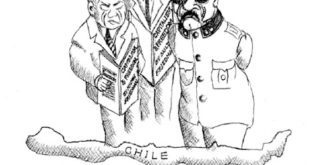By Thomas PalleySeptember 11, 2023, marks the fiftieth anniversary of General Pinochet’s military coup against Chilean President Salvador Allende. While it is now widely recognized that Pinochet authorized large-scale human rights abuses, there is an accompanying narrative that he also unleashed an economic miracle via embrace of Milton Friedman’s “Chicago Boys” vision of a market economy.The “Pinochet economic miracle” narrative is profoundly misleading. Worse yet, it is a political menace...
Read More »Structuralism, Calssical Political Economy and Demand-led Growth
[embedded content] Roundtable with Esteban, and Carlos Bastos Pinkusfeld on Structuralism, Classical Political Economy and Demand-led Growth at the Instituto de Economia, at my alma matter earlier this summer.
Read More »Hysteresis in economics
Hysteresis, not hysteria New paper by Thomas Palley. From the abstract:This paper argues for broadening the application of hysteresis to institutions, policy lock-in, psychology, identity, and economic ideas. Hysteresis is an element of historical processes, and the real world is historical. That explains why hysteresis is pervasive and important. Hysteresis should be a fundamental building block of political economy. Expanding its application in economics is both an opportunity and a...
Read More »Serrano on conflict inflation and inertia (in Portuguese)
[embedded content]Must see video (but I'm sorry to say in Portuguese). The talk at the last Demand-led Growth conference not yet available was in English, but much shorter. Once that is published I'll link it here.
Read More »Lulismo’s Past and Present
Lula da Silva’s return to the presidency in Brazil has opened up the possibility of deepening democracy and expanding the scope of egalitarian advance for the Brazilian working class. In what ways might his administration pursue expansionary fiscal and redistributive policies that would improve the conditions of his political base?In the latest print issue of Catalyst, Matías Vernengo explores the historical and contemporary contours of Brazil’s political economy and outlines how the Lula...
Read More »On Milei’s economic plans for Argentina
Sturzenegger thanks Milei for his support while he was at the BCRA Javier Milei's victory in the primary election has set alarms in Argentina. Many suggest that this was unexpected, and in a sense, given the more recent polls, it was. Also, many have suggested that his strong showing represents a protest vote, since he is a complete outsider, and that this is a repeat of the 2001/2 protests that demanded that all established politicians were ousted (que se vayan todos). But these are at...
Read More »Some brief thoughts on Bidenomics
There has been a lot of writing about Bidenomics (a name that might stick, like Reaganomics; nobody really thinks of Clintonomics as a thing) recently. It is fundamentally about the return of industrial policy, even if I personally think that this is less momentous than what people think. Don't get me wrong, both the rediscovery of fiscal policy after the 2007-9 recession (no fiscal packages after the 1990-91 or 2001 recessions, but packages after both 2007-9 and Pandemic in 2020), and the...
Read More »On Milei’s victory in Argentina for Portuguese TV (in Portuguese)
[embedded content]I'll post more on this soon. A few things, his economic ideas show a complete lack of understanding of basic principles. That he is taken seriously by a good chunk of the Argentina media (which is responsible for his rise) is appalling. I also don't think that it is certain that he will win, but in truth the mere possibility is frightening.
Read More »Inflation Paranoia and the Return of the New Consensus in Macroeconomics
And inflation will remain high, very highThis was published a while ago. I forgot to link it here. Their summary: Economists have proposed two main theories to explain the recent spike in prices. Progressives have attributed the rise in inflation to corporate greed and have suggested price controls in response. Other economists have turned back to the New Consensus in Macroeconomics that arose in the 1970s in response to steep inflation blamed on the large Keynesian fiscal expansion of the...
Read More »What’s driving inflation? Bucknell prof says maybe not what you think
[embedded content]My interview with Scott LaMar from WTFI, on inflation and the problems with demand-pull and oligopolistic inflation, for those interested in another iteration of the same. It's a bit longer than previous ones, and we go on some additional detail.
Read More » Naked Keynesianism
Naked Keynesianism






